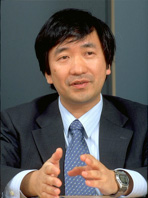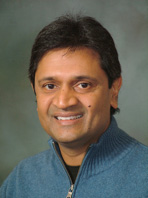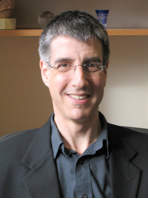Plenary talks
 |
ICRA2009 will organize three plenary talks, scheduled at 17:30-18:30 on May 13, 14 and 15.
May 13, 2009, 17:30-18:30
- IRT Research to Support People and Aging Society
Prof. Isao Shimoyama (University of Tokyo, Tokyo, Japan)
May 14, 2009, 17:30-18:30
- Computational Cameras: Redefining the Image
Prof. Shree K. Nayar (Columbia University, New York, USA)
May 15, 2009, 17:30-18:30
- Probabilistic models of human sensorimotor control
Prof. Daniel Wolpert (University of Cambridge, Cambridge, UK)
|
Plenary Talk I
Wednesday, 13 May 2009
17:30-18:30, Portopia Hall (Kobe Portopia Hotel)
Chair: Shigeki Sugano (Waseda University)
IRT Research to Support People and Aging Society

Prof. Isao Shimoyama
The University of Tokyo
Tokyo, Japan
Abstract
Japan becomes aged society with fewer children first in the world. The population decreases to three-quarters of present population in 50 years. The ratio of elderly people increases from 20% to 40%. Moreover, the single-person household increases. To maintain people's income and QOL, some actions, for example, support by the social system, the family's understanding, and immigration intake, etc. are necessary. In addition, it is thought that IRT (fusion of IT and RT) contributes to both the efficiency improvement of the home production and the expansion of the senior citizen activities. Our IRT research initiative has conducted research and development by the cooperation between industries and The University of Tokyo. I'm going to show the elemental technologies of IRT, and the IRT applications such as the Assistant Robots, Personal Mobile Robots, and Kitchen Robots.
Biography
Isao Shimoyama was born in Japan in 1955. He received the B.E., M.E., and Dr. of Engineering degrees in mechanical engineering from The University of Tokyo in 1977, 1979, and 1982, respectively. He joined The University of Tokyo in 1982. He is presently Dean of Graduate School of Information Science and Technology, and Director of Information and Robot Technology (IRT) Research Initiative. His current research interest is in useful robots based on IRT including MEMS Sensors for safety and reliability.
Plenary Talk II
Thursday, 14 May 2009
17:30-18:30, Portopia Hall (Kobe Portopia Hotel)
Chair: Kevin Lynch (Northwestern University)
Computational Cameras: Redefining the Image

Prof. Shree K. Nayar
Columbia University
New York, USA
Abstract
In this talk, we will first present the concept of a computational camera. It is a device that embodies the convergence of the camera and the computer. It uses new optics to select rays from the scene in unusual ways, and an appropriate algorithm to process the selected rays. This ability to manipulate images before they are recorded and process the recorded images before they are presented is a powerful one. It enables us to experience our visual world in rich and compelling ways. We will show computational cameras that can capture wide angle, high dynamic range, multispectral, and depth images. Finally, we will explore the use of a programmable light source as a more sophisticated camera flash. We will show how the use of such a flash enables a camera to produce images that reveal the complex interactions of light within objects as well as between them.
Biography
Shree K. Nayar received his PhD degree in Electrical and Computer Engineering from the Robotics Institute at Carnegie Mellon University in 1990. He is currently the T. C. Chang Professor of Computer Science at Columbia University. He co-directs the Columbia Vision and Graphics Center. He also heads the Columbia Computer Vision Laboratory (CAVE), which is dedicated to the development of advanced computer vision systems. His research is focused on three areas; the creation of novel cameras, the design of physics based models for vision, and the development of algorithms for scene understanding. His work is motivated by applications in the fields of digital imaging, computer graphics, and robotics.
He has received best paper awards at ICCV 1990, ICPR 1994, CVPR 1994, ICCV 1995, CVPR 2000 and CVPR 2004. He is the recipient of the David Marr Prize (1990 and 1995), the David and Lucile Packard Fellowship (1992), the National Young Investigator Award (1993), the NTT Distinguished Scientific Achievement Award (1994), the Keck Foundation Award for Excellence in Teaching (1995) and the Columbia Great Teacher Award (2006). In February 2008, he was elected to the National Academy of Engineering.
Plenary Talk III
Friday, 15 May 2009
17:30-18:30, Portopia Hall (Kobe Portopia Hotel)
Chair: Raja Chatila (LAAS-CNRS)
Probabilistic models of human sensorimotor control

Prof. Daniel Wolpert
University of Cambridge
Cambridge, UK
Abstract
The effortless ease with which humans move our arms, our eyes, even our lips when we speak masks the true complexity of the control processes involved. This is evident when we try to build machines to perform human control tasks. While computers can now beat grandmasters at chess, no computer can yet control a robot to manipulate a chess piece with the dexterity of a six-year-old child. I will review our recent work on how the humans learn to make skilled movements covering probabilistic models of learning and decision making in the face of uncertainty.
Biography
Daniel Wolpert read medical sciences at Cambridge and clinical medicine at Oxford. After working as a medical doctor for a year he completed a PhD in the Physiology Department at Oxford. He then worked as a postdoctoral fellow at MIT, before moving to the Institute of Neurology, UCL. In 2005 he took up the post of Professor of Engineering for the Life Sciences at the University of Cambridge and is a Fellow of Trinity College. His research interests are computational and experimental approaches to human sensorimotor control (www.wolpertlab.com).
|

